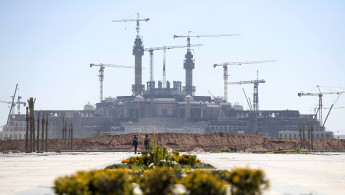New US$26m luxurious mosque outrages Egyptians as economy collapses
At a time when Egypt has been facing an unprecedented economic crisis for over two years now, president Abdel-Fattah al-Sisi recently inaugurated a record-breaking mosque in the New Administrative Capital.
The New Grand Egyptian Mosque – annexed to a cultural, Islamic centre – has a 16.6-metre-high pulpit, handcrafted from the finest type of wood, and the heaviest chandelier in the world, weighing 50 tons with a 22-metre diametre made of four levels.
The rather luxurious mosque is equipped to host a total of 107,000 worshippers at a time. It is located in a remote area inside the administrative capital, 45 kilometres east of Cairo, and was inaugurated by Sisi on the eve of the holy Muslim month of Ramadan.
The huge 19,000 square-metre building cost 800 million Egyptian pounds (around $US 26 million), an extravagant cost that triggered widespread criticism among Egyptians on social media.
أثقل نجفة و أطول منبر و أكبر مسجد و أعلى برج و أروع انهيار اقتصادي https://t.co/7qjLLNFDhN
— إيهاب في مدينة البهائم (@EhabFarag_) March 23, 2023
Ehab Farag, an Egyptian Twitter user, wrote: "The heaviest chandelier, the highest pulpit, the biggest mosque…and the [worst] economic collapse."
Another user, Haytahm Abokhalil, rhetorically wrote: "The heaviest chandelier, the highest pulpit [made by] borrowing and interest in a mosque inside the desert…in a country whose people are drained by hunger?"
أثقل نجفة وأكبر منبر بالدين والسلف والفوائد في مسجد في الصحراء
— Haytham Abokhalil هيثم أبوخليل (@haythamabokhal1) March 23, 2023
رغم وجود مسجد الفتاح العليم على مقربة منه في بلد الناس الجوع هلكها؟ pic.twitter.com/5duFI6E0pw
Egypt's external debt soared by 5.1 per cent during the fourth quarter of 2022, reaching $US 162.94 billion.
In October last year, the central bank of Egypt imposed an exchange rate flexibility, allowing the value of the Egyptian pound to be regulated by market forces in a bid to save an already ailing economy after securing a US$3 billion loan from the International Monetary Fund (IMF).
The country's economy has been hit hard by the Covid-19 pandemic and the Ukrainian-Russian war, factors that further disrupted global markets and hiked oil and food prices worldwide.
Egypt's annual headline inflation soared in February this year hit 31.9 per cent.





 Follow the Middle East's top stories in English at The New Arab on Google News
Follow the Middle East's top stories in English at The New Arab on Google News


